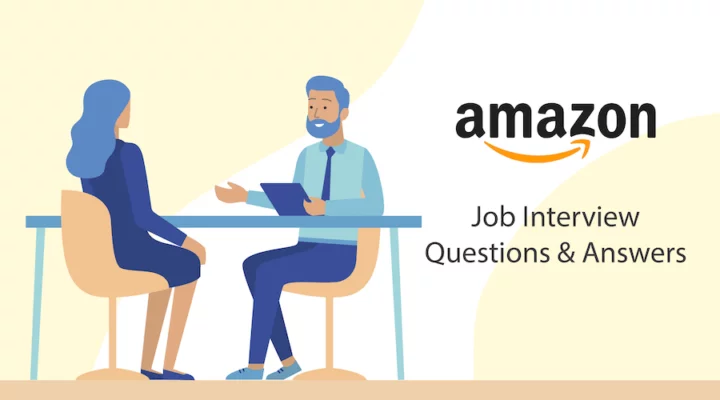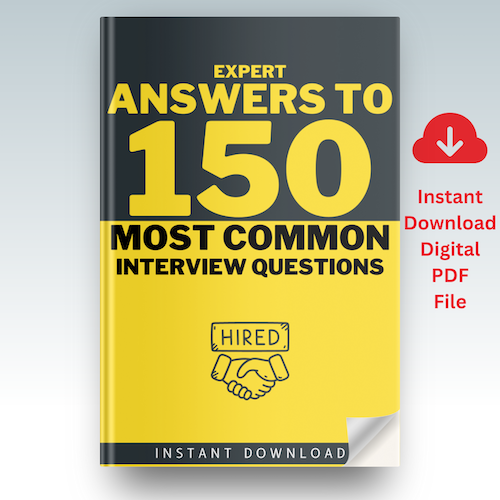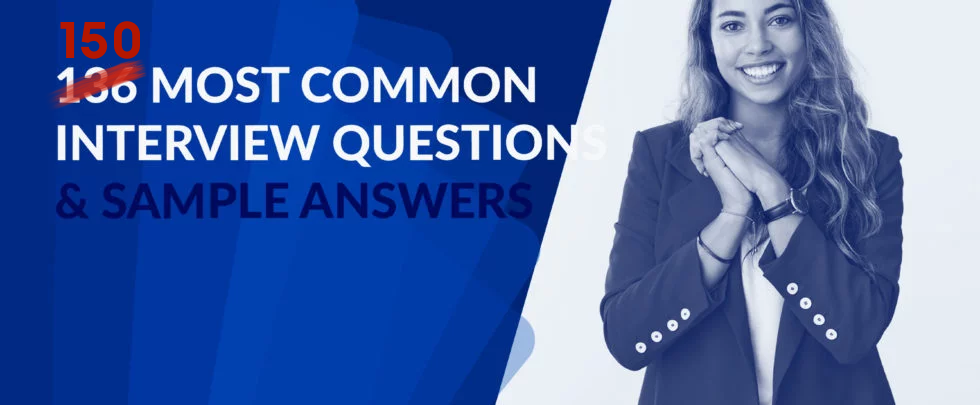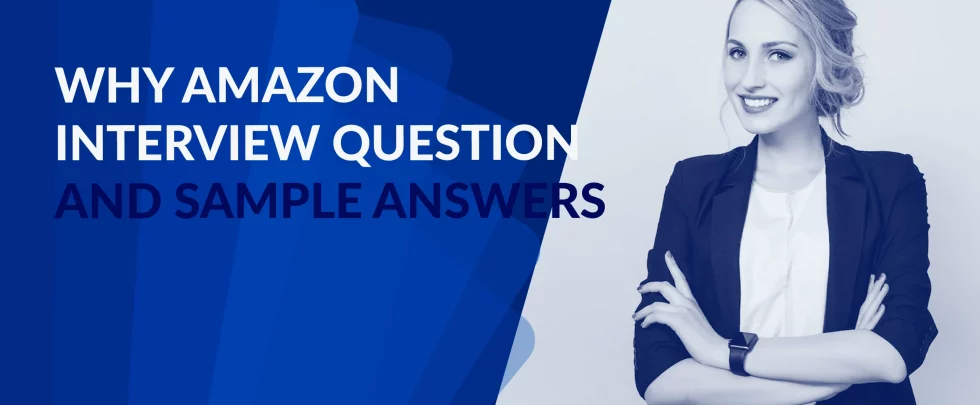I have been there, you have been there, we all have been there. You get a call or email from a recruiter inviting you for an interview and you immediately start looking for the most common interview questions that can be asked to you.
Also, you look for sample answers because well-thought-out answers will definitely help you stand out in the long and hard process of getting through the interviews…
Well, look no further! With our more than 10 years of interview consulting experience, and after months of collaboration with industry experts, current & ex-employees of top companies, and recent candidates, we created an “Interview Questions Bible” type of resource that lists the 150 most common interview questions you might be asked in your interviews, no matter which company you’re interviewing with.
These questions are relevant for all kinds of roles including but not limited to sales, marketing, operations, product, and HR managers; team leads, and senior executives for nearly all companies globally.
The list includes questions such as “Tell me about a time..” questions, personality and behavioral questions, standard questions such as weakness and strengths, and even salary/travel requirement questions to help you get ready for whatever comes at you.
We also suggest you check out our other posts like the Star Interview Technique to improve your interviewing skills as well.
Do you have an interview with Amazon?
Pro Tip
Make sure to check out our top-selling Amazon Interview Guide which comes with a full refund guarantee in case you fail your interviews.

Without further ado, let’s see the most common interview questions!
Table of Contents
150 Most Common Interview Questions

Questions List Part 1
Common Interview Questions: Warming Up
1. Tell Me About Yourself (One of the most common interview questions)
2. Why do you want to work for our company?
Common Interview Questions: Delving Into Your Skills
3. What Are Your Strengths?
4. What Are Your Weaknesses?
Common Interview Questions: Standing Out
5. Why Should We Hire You?
6. How Do You Handle Stress or Pressure?
7. How do you handle conflict or disagreement with a colleague or supervisor?
Common Interview Questions: Teamwork
8. How do you handle a difficult customer or client?
9. We’re a pretty busy company. How do you handle a heavy workload?
10. How do you handle failure or mistakes?
11. Are you good at working with a team?
12. How do you manage tough challenges and setbacks?
13. Tell me about a time you had to make a difficult decision.
14. Tell me about a time when you had to go above and beyond to meet a deadline or exceed expectations.
15. How do you handle working on multiple projects at the same time?
Common Interview Questions: Communication
16. Tell me about a time when you had to work with a team to achieve a common goal.
17. Tell me about a time when you had to make a presentation to a group of people about a difficult topic.
18. Tell me about a time when you had to work with limited resources.
19. Tell me about a time when you had to work with a team member who was not pulling their weight.
20. Tell me about a time when you had to work with a team member who was difficult to get along with.
21. Tell me about a time when you had to make a difficult or unpopular decision.
22. Tell me about a time when you had to make a presentation/ show your ideas to a group of people who were skeptical or resistant to your ideas.
Questions List Part 2
Common Interview Questions: Team Environment

23. Tell me about a time when you had to work with a team that was not aligned with your goals or vision.
24. Tell me about a time when you had to work with a team that was not performing up to expectations.
25. Tell me about a time when you had to work with a team that was not diverse or inclusive.
26. Tell me about a time when you had to work with a team that was located in a different time zone or location.
27. Tell me about a time when you had to work with a team that had a different culture or way of doing things.
28. Tell me about a time when you had to work with a team that had conflicting personalities or styles.
29. Tell me about a time when you had to work with a team that was facing a crisis or unexpected challenge.
30. Tell me about a time when you had to work with a team that was not meeting its goals or objectives.
Common Interview Questions: Conflict Resolution
31. Tell me about a time when you had to work with a team that was not aligned with your goals or vision.
32. Tell me about a time when you had to work with a team member who was difficult to get along with.
33. Tell me about a time when you had to work with a team member who was not following the rules or policies of the company.
34. Tell me about a time when you had to work with a team member who was not a good fit for the team.
35. Tell me about a time when you had to work with a team member who was not meeting their deadlines.
36. Tell me about a time when you had to work with a team member who was not meeting the quality standards of their work.
37. How do you handle conflict in the workplace?
38. How do you handle a situation where you disagree with your manager or supervisor?
39. How do you handle a situation where you have to deliver negative news to a colleague or team member?
40. How do you handle a situation where you have to deliver negative feedback to a colleague or team member?
41. How do you handle a situation where you have to work with a team member who has a different work style or personality than you?
Common Interview Questions: Decision Making
42. Describe a time when you had to solve a complex problem at work. How did you approach the problem and what was the result?
43. Describe a time when you had to make a difficult decision at work. How did you go about making the decision and what was the outcome?
44. Describe a time when you had to take on a leadership role in a project or team. How did you approach the role and what was the result?
Questions List Part 3
Common Interview Questions: Career Aspirations
45. How do you define success in your career?
46. What are your long-term career goals?
47. What are your short-term career goals?
48. How do you stay motivated and focused in your work?
49. How do you handle criticism or feedback in the workplace?
Common Interview Questions: Adaptability
50. How do you manage change or ambiguity in the workplace?
51. How do you manage a situation where you find out that you are unable to complete a task or project on time?
52. How do you manage situations where you are unable to meet a customer’s expectations?
53. How do you manage a situation where you are asked to do something that is outside of your job scope or responsibilities?
54. How do you handle a situation where you are asked to work overtime or on weekends?
Common Interview Questions: Openness to New Challenges

55. How do you react if you are asked to work on a project or task that you are not familiar with?
56. How do you handle a situation where you are asked to work with a difficult colleague or team member?
57. What are your salary expectations for this role?
58. How do you prefer to receive feedback, and how do you use feedback to improve your work?
59. How do you keep yourself updated on industry trends and developments?
60. How do you handle a situation where you are asked to do something that goes against your values or beliefs?
Common Interview Questions: Honesty and Growth
61. What is your biggest failure?
62. What is your biggest achievement?
63. What is your ideal company like?
Common Interview Questions: Addressing Gaps
64. What’s the most difficult decision you’ve made in your last job and how did you come to that decision?
65. Give an example of an out-of-the-box idea that you implemented that had a big impact.
66. Why was there a gap in your employment?
67. Why are you thinking to leave your current company?
68. Can you explain why you want to change your career path?
Questions List Part 4
Common Interview Questions: Personality
69. How would your previous manager describe you?
70. How would your friends describe you?
72. What do you like to do outside of work?
73. Tell me the difference between good and exceptional.
74. What makes you unique?
Common Interview Questions: Creativity
75. What is the one book you read that impressed you most recently?
76. How do you approach problem-solving when faced with a complex or unfamiliar challenge?
77. If you could invent a new holiday, what would it be and how would it be celebrated?
78. If you could travel back in time to any moment in history, where would you go and why?
79. If you were a character in a movie, which movie would you be in and why?
80. If you could live in any time period, which would you choose and why?
81. If you could be any animal, which would you be and why?
82. You are on a game show and have the choice of three doors. Behind one of the doors is a prize, and behind the other two doors are goats. You choose a door, but the host, who knows what is behind each door, opens one of the other doors, revealing a goat. The host then offers you the choice of staying with your original door or switching to the remaining unopened door. What do you do and why?
83. How many golf balls can you fit inside a 747 airplane?
Common Interview Questions: Leadership Ability
84. Can you describe a time when you had to motivate a team that was struggling or facing a difficult challenge?
85. Can you give an example of a time when you had to manage conflict within a team?
86. Can you give an example of a time when you had to motivate a team to achieve a common goal?
87. Can you describe a time when you had to adapt to a change in the work environment? How did you handle the change and what was the outcome?
88. Can you describe a time when you had to implement a new process or procedure in your organization? How did you go about it and what was the outcome?
Common Interview Questions: Strategic Thinking
89. How do you define a product vision and how do you go about communicating it to your team and stakeholders?
90. How do you go about conducting market research for a new product?
91. How do you prioritize features and initiatives in the product development process?
92. How do you define success in your career and how do you measure it?
Common Interview Questions: Self-Motivation
93. How do you stay motivated and engaged in your work?
94. How do you define high performance and how do you strive to achieve it in your work?
95. Can you give an example of a time when you had to overcome a challenge or obstacle to deliver high-quality results?
96. How do you handle pressure and deadlines in your work?
Questions List Part 5
Common Interview Questions: Sales & Communication Skills
97. Sell me this pen.
98. How would you compare and contrast two different products in terms of their features and benefits?
99. How would you compare and contrast two different business models in terms of their profitability and sustainability?
100. How would you compare and contrast two different marketing strategies in terms of their effectiveness and efficiency?
101. How would you compare and contrast two different approaches to project management in terms of their effectiveness and efficiency?
Common Interview Questions: Analytical Thinking & Evaluation Skills
102. How would you compare and contrast two different suppliers in terms of their quality and price?
103. How would you compare and contrast two different job candidates in terms of their qualifications and fit for the role?
104. How would you compare and contrast two different proposals in terms of their feasibility and potential impact on the company?
105. How would you compare and contrast two different job offers in terms of their compensation and benefits packages?
106. How would you compare and contrast two different customer segments in terms of their needs and preferences?
107. How would you compare and contrast two different regions in terms of their potential for business growth and expansion?
108. How do you involve others in the decision-making process, and why is this important?
Common Interview Questions: Resourcefulness & Quick Decisions
109. Describe a time when you had to make a quick decision in the workplace. How did you ensure that it was a good decision?
110. How do you approach new clients in account management for a consulting engagement? What steps do you take to understand the client’s needs and objectives?”
111. What methods do you use to identify new opportunities and build relationships with clients/new candidates?
112. Describe a situation in which you had to overcome a language or cultural barrier on a project you’re working on.
113. Describe a time when you had to work with limited resources or constraints. How did you adapt and deliver results in this situation?
114. What do you think sets you apart from other candidates for this role?
Common Interview Questions: Career Alignment & Vision
115. What are your long-term career goals, and how does this role fit into those goals?
116. When can you start?
117. Where do you see yourself in three years?
118. What separates hard work from smart work?
119. Why was your GPA low?
120. Are you willing to travel for this job / how much?
121. What do you plan to accomplish in this job in the first 90 days?
Questions List Part 6
Common Interview Questions: Management Style
122. What criteria are you using to evaluate people reporting to you?
123. Describe a typical work day for you.
124. If we cannot fill this product manager position with you, we have another alternative account manager position. Will you be interested in that?
125. Did you ever quit a job? Why?
126. Tell me about the biggest risk you have taken in your life.
Common Interview Questions: Adaptability & Efficiency
127. How do you keep track of a remote team that is working for you?
128. What is the biggest challenge you think you’ll face in this job?
129. Explain Artificial Intelligence to a child.
130. I see that you were a team lead in your previous job. What were the top 3 qualities of your team collectively?
Common Interview Questions: Company Knowledge
131. What do you know about our company?
132. Are you legally authorized to work in US? (or the company you’ll be hired in)
Common Interview Questions: Academic Background & Learning
133. What academic courses did you like the best?
134. What do you think the future of this business will look like?
135. Do you prefer to be an individual contributor or a team member?
136. Do you have any questions for me?
Common Interview Questions: Additional Questions
137. Can you describe a time you had to learn a new skill quickly? How did you approach the learning process?
138. Tell me about a time you disagreed with a decision made by a supervisor. How did you voice your concerns?
139. Can you walk me through your thought process for solving a complex problem?
140. How do you measure success in a project?
141. Can you describe a situation where you had to deal with a large amount of data? How did you analyze it and what insights did you gain?
142. Tell me about a time you had to prioritize multiple tasks. How did you manage your workload?
143. How do you stay up-to-date on current events in your industry?
144. What are your biggest professional pet peeves? How do you avoid them?
Common Interview Questions: Recent Developments in AI / Technology
145. Imagine you’re working on a project that could benefit from using AI. How would you go about identifying the best AI tool or solution for the task?
146. The field of AI is constantly evolving. How do you stay up-to-date on the latest advancements and trends in AI??
147. In your opinion, what are some of the biggest ethical considerations surrounding the use of AI? How would you ensure responsible and ethical use of AI tools in your work?
148. Can you think of an example where AI might be used to improve efficiency or productivity for this company? How would you implement such a solution?
149. In your opinion, how will AI transform the future of work? What skills do you believe will be most valuable in the workplace as AI becomes more prevalent?
150. If you could teach an AI model one weird and wonderful human skill, what would it be and why?
..and that’s it!
We hope that you find this post useful. You can use various resources on the internet to find good answers to these crucial-to-know interview questions and we recommend every candidate to practice with these questions for your job interviews as you are almost guaranteed to get quite a few questions from this list.
If you want a single source to find well-thought-out answers to these questions, we recommend checking out our 150 Common Interview Questions & Answers eBook that covers all the questions here with tips/info about each question and detailed answers provided by current / ex-employees of top companies and recent candidates.

Have the questions and answers handy in one place.
Our 150 Common Interview Questions and Answers Guide provides expert answers to all the common questions, as well as useful tips that make a difference, all in one easily accessible guide.
If you are interviewing for a specific company, make sure to check out our top selling Interview Guides that helped more than 5000 candidates to get offers since 2016. For more content about interview support, company information and resume-building tips, make sure to check out our blog for posts on various topics.
Good luck with your interviews!
Photo by Glenn Carstens-Peters on Unsplash


